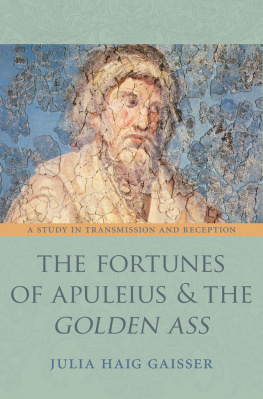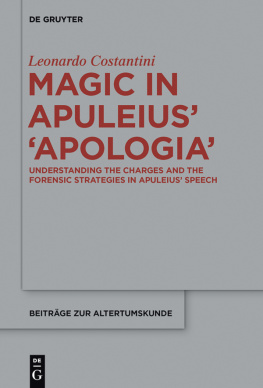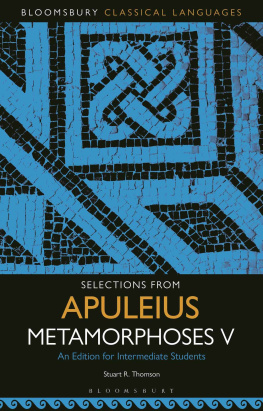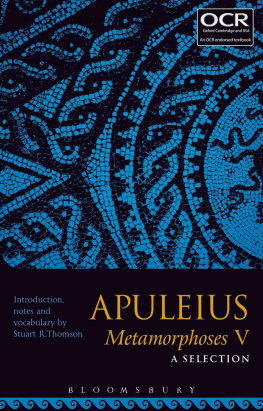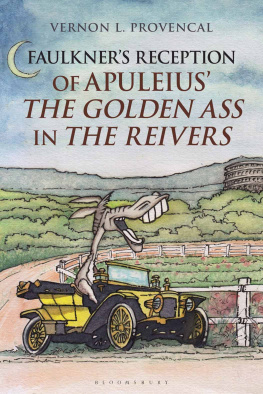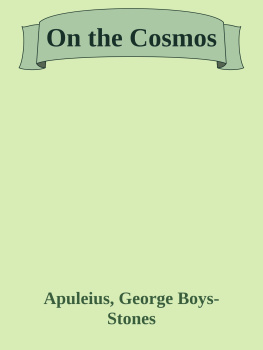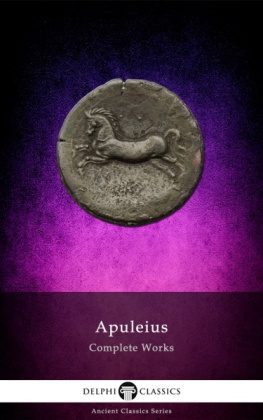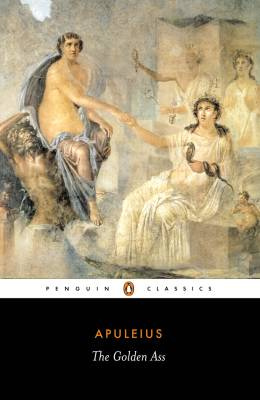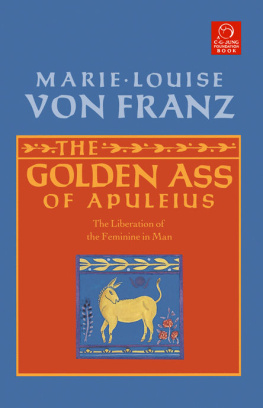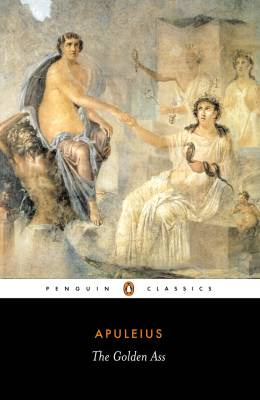Julia Haig Gaisser - The Fortunes of Apuleius and the Golden Ass
Here you can read online Julia Haig Gaisser - The Fortunes of Apuleius and the Golden Ass full text of the book (entire story) in english for free. Download pdf and epub, get meaning, cover and reviews about this ebook. year: 2021, publisher: Princeton University Press, genre: Detective and thriller. Description of the work, (preface) as well as reviews are available. Best literature library LitArk.com created for fans of good reading and offers a wide selection of genres:
Romance novel
Science fiction
Adventure
Detective
Science
History
Home and family
Prose
Art
Politics
Computer
Non-fiction
Religion
Business
Children
Humor
Choose a favorite category and find really read worthwhile books. Enjoy immersion in the world of imagination, feel the emotions of the characters or learn something new for yourself, make an fascinating discovery.
- Book:The Fortunes of Apuleius and the Golden Ass
- Author:
- Publisher:Princeton University Press
- Genre:
- Year:2021
- Rating:3 / 5
- Favourites:Add to favourites
- Your mark:
- 60
- 1
- 2
- 3
- 4
- 5
The Fortunes of Apuleius and the Golden Ass: summary, description and annotation
We offer to read an annotation, description, summary or preface (depends on what the author of the book "The Fortunes of Apuleius and the Golden Ass" wrote himself). If you haven't found the necessary information about the book — write in the comments, we will try to find it.
The Fortunes of Apuleius and the Golden Ass — read online for free the complete book (whole text) full work
Below is the text of the book, divided by pages. System saving the place of the last page read, allows you to conveniently read the book "The Fortunes of Apuleius and the Golden Ass" online for free, without having to search again every time where you left off. Put a bookmark, and you can go to the page where you finished reading at any time.
Font size:
Interval:
Bookmark:

The Fortunes of Apuleius and the Golden Ass
MARTIN CLASSICAL LECTURES
The Martin Classical Lectures are delivered annually at Oberlin College through a foundation established by his many friends in honor of Charles Beebe Martin, for forty-five years a teacher of classical literature and classical art at Oberlin.
John Peradotto, Man in the Middle Voice: Name and Narration in the Odyssey
Martha C. Nussbaum, The Therapy of Desire: Theory and Practice in Hellenistic Ethics
Josiah Ober, Political Dissent in Democratic Athens: Intellectual Critics of Popular Rule
Anne Carson, Economy of the Unlost (Reading Simonides of Keos with Paul Celan)
Helene P. Foley, Female Acts in Greek Tragedy
Mark W. Edwards, Sound, Sense, and Rhythm: Listening to Greek and Latin Poetry
Michael C. J. Putnam, Poetic Interplay: Catullus and Horace
Julia Haig Gaisser, The Fortunes of Apuleius and the Golden Ass: A Study in Transmission and Reception
The Fortunes of Apuleius and the Golden Ass
A STUDY IN TRANSMISSION AND RECEPTION
Julia Haig Gaisser
PRINCETON UNIVERSITY PRESS
PRINCETON AND OXFORD
Copyright 2008 by the trustees of Oberlin College
Requests for permission to reproduce material from this work should be sent to Permissions, Princeton University Press
Published by Princeton University Press, 41 William Street, Princeton, New Jersey 08540 In the United Kingdom: Princeton University Press, 3 Market Place, Woodstock, Oxfordshire OX20 1SY
All Rights Reserved
Library of Congress Cataloging-in-Publication Data
Gaisser, Julia Haig.
The fortunes of Apuleius and the Golden Ass: a study in transmission and reception / Julia Haig Gaisser.
p. cm. (Martin classical lectures)
Includes bibliographical references and index.
ISBN: 978-0-691-13136-8 (hardback: alk. paper)
eISBN 978-1-400-84983-3
1. Apuleius. Metamorphoses. 2. Latin fictionHistory and criticism. 3. Latin wit and humorHistory and criticism. I. Title.
PA6217.G35 2008
873.009dc22 2007020949
British Library Cataloging-in-Publication Data is available
press.princeton.edu
R0
For T. K. G.
Illustrations
PLATES
FIGURES
Preface
Apuleius Metamorphoses (often called the Golden Ass) is the only complete Latin novel to have come down to us. This book examines the causes and mechanisms of its survival and the ways in which it was read and interpreted from antiquity through the sixteenth century. The history of these intersecting and interrelated themes of transmission and reception is not unlike the plot of the Golden Assfull of adventures, chance meetings, mistaken identity, opportunism, and narrow escapes. It is inextricably linked with the reception of Apuleius himself; his reputation as a philosopher, together with perceptions of the personality or image he projected in his works, shaped later interpretations of the Golden Ass and contributed to its survival.
I began to think about the Golden Ass quite by chance over twenty years ago when I came upon a little manuscript bound into a Renaissance edition of Catullus. Its text, irresistibly entitled Lepida fabula de adulterio (A Charming Tale of Adultery), turned out to be an obscene sixteenth-century pastiche of the adultery stories in book 9 of the Golden Ass. Unaccountably inspired by this deplorable work (which will not appear elsewhere in this volume), I agreed to write the article on Apuleius for the Catalogus Translationum et Commentariorum and started to collect material on Apuleius manuscripts and interpretations. But other projects intervened, and I made little progress. An invitation from the Department of Classics at Oberlin College to deliver the Martin Classical Lectures provided me with the stimulus and opportunity to work on Apuleius in earnest. I thought that it might be fun to talk about the reception of the Golden Ass. And indeed it was.
Following the fortunes of Apuleius and his novel has turned out to be even more rewarding than I imagined. The reception of the Golden Ass is wonderfully diverse, including literary, critical, and artistic interpretation in a variety of periods and genres. Its fortunes both intersect with and illuminate each of the major events in the transmission of classical literature, providing us with the opportunity to observe the novel at each step in the series: the transition from roll to codex, transcription in a monastic scriptorium, rediscovery at the beginning of the Renaissance, the transition from manuscript to print, university teaching, and finally the appearance of the translated book as a commercial product.
This book is based on the four Charles Beebe Martin Classical Lectures I presented at Oberlin College in the spring of 2000. I called the lectures Transformations of Apuleius, but my present title is intended to be more descriptive and at least slightly more precise. I have expanded the original four lectures to seven chapters to fill in lacunae in the original presentation. I have also devoted even more attention to the visual reception of Apuleius and the Golden Ass than I did in the lectures, since the numerous artistic representations in paintings, manuscripts, and printed books have much to say about the interpretations and mind-set of their makers. Without them the story of the fortunes of Apuleius and his novel would be one-sided and incomplete. All quotations from Latin and other languages have been translated; the translations, unless otherwise noted, are my own.
Some portions of my discussions of Fulgentius, Boccaccio, and Beroaldo have appeared in earlier versions: Teaching Classics in the Renaissance: Two Case Histories (Presidential Address to the American Philological Association: TAPA, 2001); Allegorizing Apuleius: Fulgentius, Boccaccio, Beroaldo, and the Chain of Receptions (Acta Conventus Neo-Latini Cantabrigiensis, 2003); Reading Apuleius with Filippo Beroaldo (in Being There Together: Essays in Honor of Michael C. J. Putnam on the Occasion of His Seventieth Birthday, 2003); Filippo Beroaldo on Apuleius: Bringing Antiquity to Life (in On Renaissance Commentaries, 2005); Apuleius in Florence: From Boccaccio to Lorenzo de Medici (in Classica et Beneventana: Essays Presented to Virginia Brown on the Occasion of Her 65th Birthday, 2007).
The happiest part of completing any long project is the opportunity to thank all those who made it possible. My greatest thanks must go to the Charles Beebe Martin Lecture Fund and to the Department of Classics at Oberlin College for their invitation, their hospitality, their splendid collegiality, and their patience in waiting for this book. More than they know, Nate Greenberg, Jim Helm, and Tom Van Nortwick influenced this final product. I am also grateful both to the National Endowment for the Humanities and to Bryn Mawr College for their support.
Anyone who ventures into the waters of reception is soon out of her depth and needs the help of friends who know the shoals and currents of foreign times and places. I have benefited from the generosity of many who helped me navigate strange waters from late antiquity to sixteenth-century Germany and France and places in between. They include Oliver Nicholson, Benjamin Todd Lee, Carol Kaske, James John, Frank Coulson, Danuta Shanzer, Greg Hays, Ann Kuttner, Erika Simon, Francis Newton, Michael Maas, John Duffy, Marianne Pade, Bruce Swann, Patricia Osmond, Craig Kallendorf, Stella Revard, David Marsh, Lawrence Buck, Anna Grotans, Walther Ludwig, Philip Ford, and Ann Moss. My Bryn Mawr colleagues have assisted me in countless ways; in particular I want to thank Pat McPherson, Alice Donohue, Dale Kinney, Darby Scott, David Cast, Nancy Dersofi, Peter Koelle, and Roberta Ricci. I have been helped time and again by many librarians, but especially Robert Babcock of the Beinecke Library and John Pollack of the Van Pelt-Dietrich Library of the University of Pennsylvania, as well as Anne Slater, Andrew Patterson, Charles Burke, Eric Pumroy, Marianne Hansen, Camilla MacKay, and Elliott Shore of the Bryn Mawr College Library. And finally, I owe special thanks to Helen North, Nico and Kezia Knauer, James ODonnell, Virginia Brown, and James Hankins for the gift of their learning and friendship.
Font size:
Interval:
Bookmark:
Similar books «The Fortunes of Apuleius and the Golden Ass»
Look at similar books to The Fortunes of Apuleius and the Golden Ass. We have selected literature similar in name and meaning in the hope of providing readers with more options to find new, interesting, not yet read works.
Discussion, reviews of the book The Fortunes of Apuleius and the Golden Ass and just readers' own opinions. Leave your comments, write what you think about the work, its meaning or the main characters. Specify what exactly you liked and what you didn't like, and why you think so.

